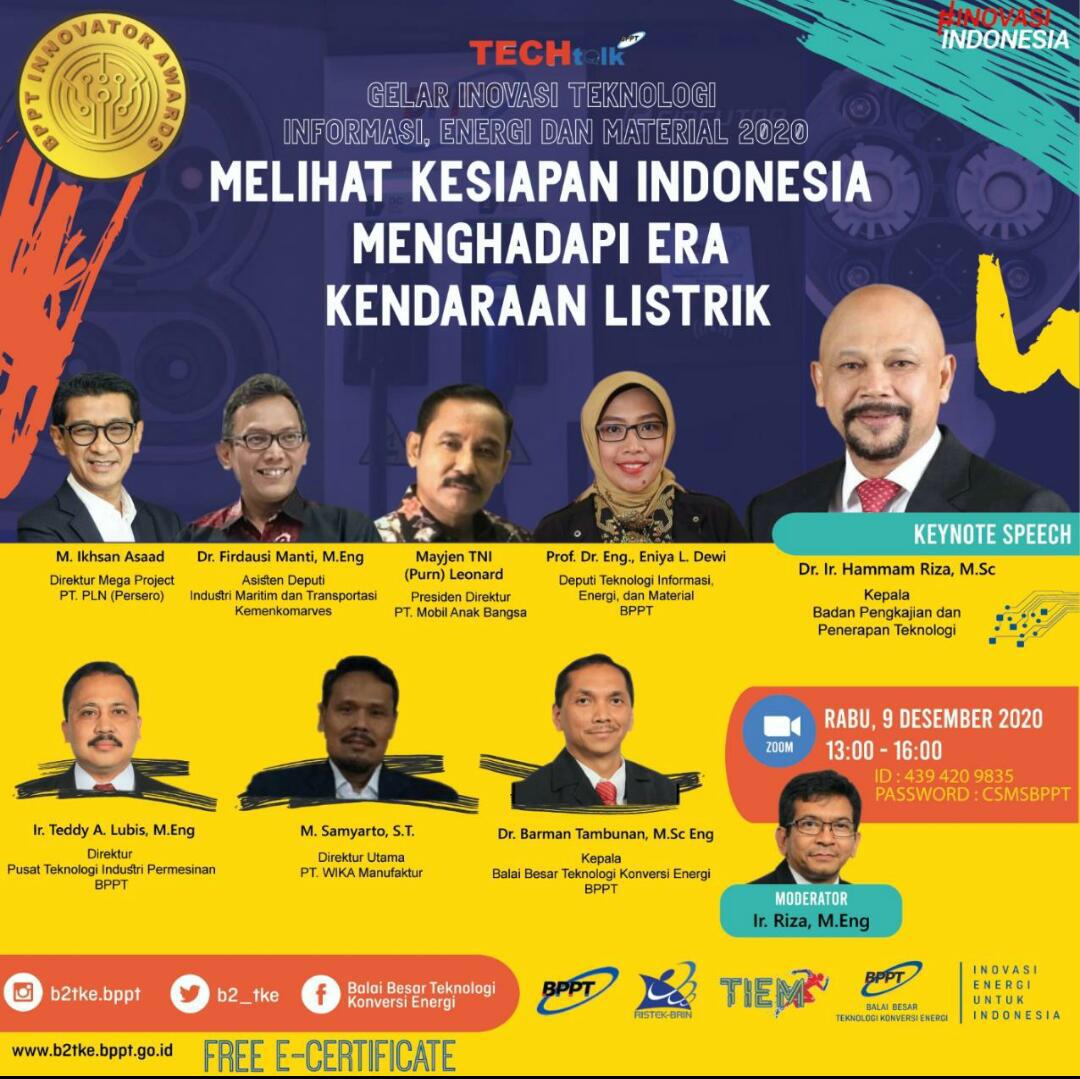TechTalk on Indonesia Readiness in Transitioning to Electric Vehicles
B2TKE (Badan Besar Teknologi Konversi Energi) held an online webinar on the country's readiness when it comes to a complete transition towards widespread electronic vehicle adoption. It featured multiple speakers as representatives of the automotive, transportation, and energy industry, and Dr. Ir. Hammam Riza, M.Sc, the head of Badan Pengkajian dan Penerapan Teknologi, as a keynote speaker.
The webinar was held via Zoom on Wednesday, December 9th 2020, from 13:00 to 16:00.

The keynote speech, given by Dr. Ir Hammam Riza highlighted battery electric vehicle (BEV) as a disruptive technology in the Idonesian automotive industry. BPPT endorses the conducive establishment of a BEV ecosystem through technology clearing, followed by technology manufacturing diversion to Indonesian manufacturers, and finally, technology innovation by Indonesian industry players. Furthermore, the speech also suggested a solution for an optimal reduction of green house gas emissions in Indonesia through the electrification of public transportation with renewable energy generation, supported by the replacement of government service vehicles with BEV alternatives to commence an initial market. Finally, BPPT recommends policies regarding a national production threshold scheme (TKDN) or appropriate business models to support local industry players.
The first speaker, Prof. Dr. Eng. Eniya L. Dewi, delivered a talk concerning the massive potential for LCEV (low carbon emission vehicles) in the Indonesian automotive market and the establishment of supporting systems in the near future. She highlighted the collaborative role of multiple local stakeholders, from PLN as a charging station supplier to the BSN for product standardization. Consequently, she presented a roadmap detailing EV adoption in 2020, increasing investment for BEV assembly in 2021, local spare parts manufacturing in 2022, and large scale manufacturing of major BEV components in 2023 to 2025. Next, she detailed the establishment of the local charging station industry to support the BEV ecosystem as well as the plan to commercialize charging stations, maximize local manufacturing of fast charging batteries, and the study of raw material production by 2024. Finally, she introduced a few supporting systems such as Sonik (a charging station management system application), battery recycling technologies, and an alternative fuel cell technology for LCEV.
The second speaker was Dr. Firdaus Manti from the Coordinating Ministry of Maritime and Investment Affairs. Based on the presentation, the acceleration of BEV adoption in Indonesia is derived from the 55th Presidential Decree of 2019 which detailed incentives, infrastructure planning, and standardization. Dr. Manti also presented annual targets consisting of regulation finalization by the end of 2020, followed by the shift from ICE (internal combustion engine) vehicles to BEV gradually from 2021 to 2024. He further detailed strategic policies through the replacement of government service vehicles with BEV alternatives, aiming a complete replacement by 2024. Last, he explained plans for regional policies in the form of tax reliefs for EV owners, traffic law leniencies, and adoption of EV-based public transportation.
The next presentation revolved around the establishment of both public and private charging stations by PLN, the Indonesian national electricity company. They introduced available business models for a maximized number of public charging stations as well as expected numbers of charging facilities in the near future. There are currently showcase charging facilites already launched in big cities such as Jakarta, Bandung, and Bali. Furthermore, PLN also presented the plans for a controlled home charging system using a CSMS integrated to individual EV users.
For the next presentation, a representative from BPPT, Dr. Ir. Barman Tambunan, presented a charging station management system (CSMS) for Indonesian EV charging facilities. The CSMS is supposed to integrate nationwide charging stations, EVs and EV users in a single database. Dr. Tambunan also presented Sonik, a web and mobile-based app that will be used to control EV charging facilities nationwide.
The last two presentations were concerned with EV alternatives for existing popular vehicles. Mayjend TNI (Purn) Leonard represented PT MAB (Mobil Anak Bangsa), explained MAB's readiness in preparing the shift from ICE buses to EV buses. PT MAB has successfully manufactured a market-ready alternative for buses, and will be playing their role in establishing a strong national economy based on national manufacture. Next, Mr. Samyarto of PT. Wika Industri Manufaktur (WIMA), explained the replacement of the most popular motorized vehicle in Indonesia, the motorbikes, with an EV alternative.
The presentations given throughout the webinar can be downloaded at:
http://b2tke.bppt.go.id/index.php/id/download-materi
| Date | : | 08 December 2020 |
| Written by | : | |
| Share Article | ||